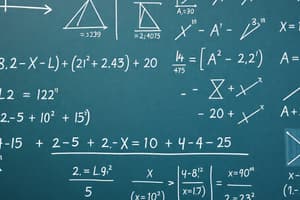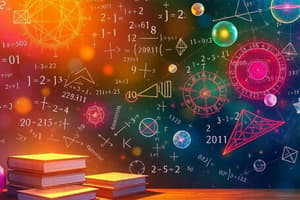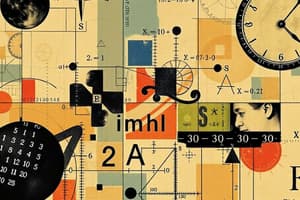Podcast
Questions and Answers
What is the correct order of operations in arithmetic?
What is the correct order of operations in arithmetic?
- Division, Subtraction, Parentheses, Exponents
- Addition, Subtraction, Multiplication, Division
- Multiplication, Addition, Division, Subtraction
- Parentheses, Exponents, Multiplication and Division, Addition and Subtraction (correct)
Which of the following best describes a variable in algebra?
Which of the following best describes a variable in algebra?
- A specific equation with known solutions
- A symbol representing a constant
- A symbol used to represent unknown values (correct)
- A fixed numerical value
What does the Pythagorean theorem relate to?
What does the Pythagorean theorem relate to?
- The area of a circle
- The properties of parallel lines
- The relationship between the angles of a triangle
- The sides of a right triangle (correct)
What is a derivative in calculus?
What is a derivative in calculus?
What is the main purpose of inferential statistics?
What is the main purpose of inferential statistics?
What does probability measure?
What does probability measure?
Which of the following defines prime numbers?
Which of the following defines prime numbers?
Which logical operator would best represent 'not'?
Which logical operator would best represent 'not'?
Flashcards are hidden until you start studying
Study Notes
Key Concepts in Mathematics
1. Arithmetic
- Basic operations: Addition, Subtraction, Multiplication, Division.
- Order of operations: PEMDAS/BODMAS (Parentheses, Exponents, Multiplication and Division, Addition and Subtraction).
2. Algebra
- Variables: Symbols used to represent unknown values.
- Expressions: Combinations of numbers, variables, and operations.
- Equations: Statements that two expressions are equal, often solved for a variable.
3. Geometry
- Shapes: Basic figures such as triangles, squares, circles.
- Properties: Area, perimeter, volume for different shapes.
- Theorems: Pythagorean theorem, properties of angles (complementary, supplementary).
4. Trigonometry
- Relations in triangles: Sine, Cosine, Tangent functions.
- Unit Circle: Defines trigonometric functions at various angles.
- Applications: Used in physics, engineering, and computer graphics.
5. Calculus
- Limits: Understanding the behavior of functions as they approach specific points.
- Derivatives: Measure of how a function changes as its input changes.
- Integrals: Calculation of the area under the curve of a function.
6. Statistics
- Data Collection: Methods for gathering data (surveys, experiments).
- Descriptive statistics: Mean, median, mode, and standard deviation.
- Inferential statistics: Drawing conclusions from data samples.
7. Probability
- Basic concepts: Likelihood of events occurring, expressed as a number between 0 and 1.
- Probability rules: Addition rule for mutually exclusive events, multiplication rule for independent events.
8. Number Theory
- Prime numbers: Natural numbers greater than 1 that have no divisors other than 1 and themselves.
- Divisibility rules: Criteria to determine if one number divides another without a remainder.
9. Mathematical Logic
- Propositions: Statements that are either true or false.
- Logical operators: AND, OR, NOT, implications.
Study Tips
- Practice regularly with exercises and problems.
- Visualize concepts through diagrams and graphs.
- Relate mathematical concepts to real-life situations for better understanding.
Key Concepts in Mathematics
Arithmetic
- Fundamental operations include addition, subtraction, multiplication, and division.
- Remember the order of operations using PEMDAS/BODMAS: Parentheses, Exponents, Multiplication and Division (from left to right), Addition and Subtraction (from left to right).
Algebra
- Variables represent unknown values, commonly denoted by letters.
- Expressions consist of numbers, variables, and operations combined together.
- Equations assert that two expressions are equivalent and can be solved for specific variable values.
Geometry
- Basic geometric shapes include triangles, squares, and circles.
- Important properties include calculating area, perimeter, and volume for various shapes.
- Theorems such as the Pythagorean theorem and angle properties (complementary and supplementary) are fundamental.
Trigonometry
- Core relationships in triangles include sine, cosine, and tangent functions, vital for solving angle and side length problems.
- The Unit Circle is essential for defining trigonometric functions across different angles.
- Applications stretch across fields like physics, engineering, and computer graphics, showcasing its practical importance.
Calculus
- Limits provide insight into function behavior as they approach specific values, crucial for understanding continuity and behavior close to points.
- Derivatives measure the rate of change of a function concerning its variable, indicating how a function responds to changes in input.
- Integrals are used to compute the area under a function's curve, identifying the total accumulation of quantities.
Statistics
- Data collection methods include surveys and experiments, shaping how data is gathered for analysis.
- Descriptive statistics encompass measures such as mean, median, mode, and standard deviation, providing summaries of data sets.
- Inferential statistics involve making predictions or generalizations about a population based on sample data.
Probability
- Probability expresses the likelihood of an event occurring on a scale from 0 (impossible) to 1 (certain).
- Key probability rules include the addition rule for mutually exclusive events and the multiplication rule for independent events, aiding in calculating overall probabilities.
Number Theory
- Prime numbers are greater than 1 and have no divisors other than 1 and themselves, forming the basis for numerous mathematical principles.
- Divisibility rules help determine if one number can be divided by another without leaving a remainder, essential for simplifying problems.
Mathematical Logic
- Propositions are declarative statements that can be classified as true or false.
- Logical operators such as AND, OR, NOT, and implications are tools used for constructing logical arguments and reasoning.
Study Tips
- Engage in regular practice with exercises and problem-solving to build confidence and proficiency.
- Utilize diagrams and graphs for visual understanding of mathematical concepts.
- Connect mathematical ideas to real-life situations to enhance comprehension and retention.
Studying That Suits You
Use AI to generate personalized quizzes and flashcards to suit your learning preferences.




